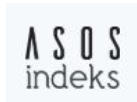Tarih Ve Sosyal Bilgiler Öğretmen Adaylarının Epistemolojik İnançlarının Karşılaştırmalı Analizi (Comparative Analysis of Epistemological Beliefs of History and Social Studies Student Teachers)
Anahtar Kelimeler:
epistemological beliefs- , prospective history teachers- prospective social studies teachers- survey modelÖzet
The aim of this research is to analyze the epistemological beliefs of prospective teachers and to make a comparative analysis. The study group of the research, which was designed according to the survey model, is composed of 386 prospective history and social studies teachers studying at Gazi University, Necmettin Erbakan University and Uşak University in the 2017-2018 school year and selected using the convenience sampling method. "Epistemic Belief Scale" was used as data collection tool. In the analysis of the data, descriptive statistics, t-test, one way anova were used. By determining the levels of prospective history and social studies teachers in each dimension of the epistemic belief scale, it was examined whether these levels show a significant difference according to various variables. The results of the research revealed the multidimensional structure of epistemological beliefs and showed that the epistemological beliefs of prospective history and social studies teachers can vary.
Referanslar
Alpan, G. B. ve Erdamar, G. K. (2014). Uygulama öğretmenlerinin ve öğretmen adaylarının epistemolojik inançlarının karşılaştırılması. Hitit Üniversitesi Sosyal Bilimler Enstitüsü Dergisi, Yıl 7, Sayı 2, ss. 241-257.
Atasoy, H. (2016, 04 Şubat). YGS’de kızlar daha başarılı. http://www.hurriyet.com.tr/ygsde- kizlar-daha-basarili-40049212 adresinden 29.12.2016 tarihinde erişildi.
Ayaz, F. (2009). Fen bilgisi öğretmen adaylarının epistemolojik inançlarının yordanması. Yayımlanmamış Yüksek lisans tezi, Ege Üniversitesi Sosyal Bilimler Enstitüsü, İzmir. https://tez.yok.gov.tr/UlusalTezMerkezi/ adresinden edinilmiştir.
Aypay, A. (2011a). Öğretme ve öğrenme anlayışları ölçeği’nin Türkiye uyarlaması ve epistemolojik inançlar ile öğretme ve öğrenme anlayışları arasındaki ilişkiler. Kuram ve Uygulamada Eğitim Bilimleri, 11(1), 7-29.
Aypay, A. (2011b). Epistemolojik inançlar ölçeğinin Türkiye uyarlaması ve öğretmen adaylarının epistemolojik inançlarının incelenmesi. Eskişehir Osmangazi Üniversitesi Sosyal Bilimler Dergisi, 12(1).
Bakır, S. ve Adak, F. (2015). Fen bilgisi öğretmen adaylarının epistemolojik inançları. Cumhuriyet International Journal of Education, 3(4).
Başbay, M. (2013). Analysing the relationship of critical thinking and metacognition with epistemological beliefs through structural equation modeling. Education and Science. 38(169). 249-262.
Baxter Magolda, M. B. (1992). Knowing and reasoning in college: Gender-related patterns in students' intellectual development. San Francisco: Jossey Bass.
Belenky, M. F., Clinchy, B. M., Goldberger, N. R. & Tarule, J. M. (1986). Womens' ways of knowing: The development of self, voice and mind. USA: Basic Books.
Belet, S. D. & Güven, M. (2011). Meta-cognitive strategy usage and epistemological beliefs of primary school teacher trainees. Educational Sciences: Theory and Practice, 11(1), 51- 57.
Biçer, B., Hafize, E. R. ve Özel, A. (2013). The relationship between the epistemological beliefs and educational philosophies of the teacher candidates adopted. Journal of Theory and Practice in Education, 9(3), 229-242.
Bolay, S. H. (2004). Felsefeye Giriş. Ankara: Akçağ Yayınları.
Brownlee, J., Purdie, N. & Boulton-Lewis, G. (2001) Changing epistemological beliefs in preservice teacher education students. Teaching in Higher Education 6(2). 247-268.
Cano, F. (2005). Epistemological beliefs and approaches to learning: Their change through secondary school and their influence on academic performance. British Journal of Educational Psychology, 75, 203–221.
Chan, K. (2003). Hong Kong teacher education students' epistemological beliefs and approaches to learning. Research in Education, 69, 36-50.
Chan, K.W. & Elliott, R.G. (2000). Exploratory study of epistemological beliefs of Hong Kong teacher education students: resolving conceptual and empirical issues. Asia Pacific Journal of Teacher Education, 28(3), 225-234.
Chan, K. W. & Elliott, R. G. (2002). Exploratory study of Hong Kong teacher education students’ epistemological beliefs: Cultural perspectives and implications on beliefs research. Contemporary Educational Psychology, 27, 392-414.
Chan, K. W. & Elliott, R. G. (2004). Relational analysis of personal epistemology and conceptions about teaching and learning. Teaching and Teacher Education, 20, 817- 831.
Chen, J. A. & Pajares, F. (2010). Implicit theories of ability of grade 6 science students: Relation to epistemological beliefs and academic motivation and achievement in science. Contemporary Educational Psychology, 35(1), 75-87.
Chinn, C. (2009). Epistemological Beliefs. 15/01/2018 tarihinde http://blog.sina.com.cn/s/blog_56b24c020101geo3.html adresinden erişilmiştir.
Conley, A. M., Pintrich, P. R., Vekiri, I. & Harrison, D. (2004). Changes in epistemological beliefs in elementary science students. Contemporary educational psychology, 29(2), 186-204.
Çelik, H. E. ve Yılmaz, V. (2013). Yapısal eşitlik modellemesi temel kavramlar uygulamalar programlama. Ankara: Anı Yayıncılık.
Demir, Ö. ve Bal, A. P. (2014). Fen ve teknoloji ile sınıf öğretmenliği öğrencilerinin epistemolojik inanç ve öğrenme stillerinin incelenmesi. Elektronik Eğitim Bilimleri Dergisi, 3(5). http://www.ejedus.org/dergi/5012-30.pdf adresinden erişilmiştir.
Demirli, C., Türel, Y. K. ve Özmen, B. (2010, Nisan). Bilişim teknolojileri öğretmen adaylarının epistemolojik inançlarının incelenmesi. Uluslararası Eğitim Teknolojileri Sempozyumu, Boğaziçi Üniversitesi, İstanbul, Turkey.
Deniz, J. (2014). Müzik öğretmen adaylarının epistemolojik inançları. Eğitimde Kuram ve Uygulama, 10(3), 667-683.
Deryakulu, D. (2014). Epistemolojik İnançlar. Y. Kuzgun ve D. Deryakulu (Eds.), Eğitimde Bireysel Farklılıklar içinde (s. 261-289). Üçüncü Basım. Ankara: Nobel Yayınevi.
Deryakulu, D. ve Büyüköztürk, Ş. (2002). Epistemolojik inanç ölçeğinin geçerlik ve güvenirlik çalışması. Eğitim Araştırmaları, 2(8), 111-125.
Deryakulu, D. ve Büyüköztürk, Ş. (2005). Epistemolojik inanç ölçeğinin faktör yapısının yeniden incelenmesi: Cinsiyet ve öğrenim görülen program türüne göre epistemolojik inançların karşılaştırılması. Eğitim Araştırmaları, 5(18), 57-70.
Dinç, E., & Üztemur, S. (2017). Investigating student teachers’ conceptions of social studies through the multi-dimensional structure of the epistemological beliefs. Educational Sciences: Theory & Practice, 17, 2093–2142. http://dx.doi.org/10.12738/estp.2017.6.0429
Dinç, E., İnel, Y. ve Üztemur, S. (2016). “Epistemik inanç ölçeği: Türkçeye uyarlama, geçerlik ve güvenirlik çalışması” Ahi Evran Üniversitesi Kırşehir Eğitim Fakültesi Dergisi. 17(3), 767-783.
Dweck, C. S. & Leggett, E. L. (1988). A social-cognitive approach to motivation and personality. Psychological review, 95(2), 256-273.
Elder, A. D. (2002). Characterizing fifth grade students’ epistemological beliefs in science. In
B. Hofer & P. R. Pintrich (Eds.). Personal Epistemology: The Psychology of Beliefs About Knowledge and Knowing (pp. 347-364). New Jersey: Lawrence Erlbaum.
Erdamar, G. K. ve Alpan, G. B. (2011). Öğretmen adaylarının epistemolojik inançları. E- Journal of New World Sciences Academy, 6(4), 2689-2698.
Erdem, M., Yılmaz, A. ve Akkoyunlu, B. (2008, Mayıs). Öğretmen adaylarının bilgi okuryazarlık özyeterlik inançları ve epistemolojik inançları üzerine bir çalışma. Uluslararası Eğitim Teknolojileri Konferansı, Eskişehir, Türkiye.
Erol, M. ve Ercan, L. (2015). Türkiye’de öğrenim gören yabancı uyruklu üniversite öğrencilerinin kişisel epistemolojileri ve benlik algılarının incelenmesi. Eğitimde Kuram ve Uygulama, 11(2), 492-520.
Eroğlu, S. E. ve Güven, K. (2006) Üniversite öğrencilerinin epistemolojik inançlarının bazı değişkenler açısından incelenmesi. Selçuk Üniversitesi Sosyal Bilimler Enstitüsü Dergisi, 16. 295-312.
Gürol, A., Altunbaş, S. ve Karaaslan, N. (2010). Öğretmen adaylarının öz yeterlik inançları ve epistemolojik inançları üzerine bir çalışma. Journal of New World Sciences Acedemy, 5(3), 1395-1404.
Hofer, B. (1994). Epistemological beliefs and first year college students: Motivation and cognition in different instructional contexts. Paper presented at the Annual Meeting of the American Psychological Association, 102nd. Los Angeles, USA.
Hofer, B. K. (2000). Dimensionality and disciplinary differences in personal epistemology.
Contemporary Educational Psychology, 25, 378-405.
Hofer, B. (2001). Personal epistemology research: Implications for teaching and learning.
Journal of Educational Psychology Review, 13(4), 353–383.
Hofer, B. K. (2004). Exploring the dimensions of personal epistemology in differing classroom contexts: Student interpretations during the first year of college. Contemporary Educational Psychology, 29(2), 129-163.
Hofer, B. & Pintrich, P. R. (1997). The development of epistemological theories: Beliefs about knowledge and knowing and their relation to learning. Review of Educational Research, 67(1), 88-144.
Holschuh, J. L. (1998). Epistemological beliefs in ıntroductory biology: addressing measurement concerns and exploring the relationships with strategy use. Unpublished doctoral dissertation, The University of Georgia, Athens. Available from ProOuest Dissertations and Theses database (UMI No. 9908606).
Hu, L. T., & Bentler, P. M. (1999). Cutoff criteria for fit indexes in covariance structure analysis: Conventional criteria versus new alternatives. Structural equation modeling: a multidisciplinary journal, 6(1), 1-55.
İçen, M., İlğan, A. ve Göker, H. (2013). Sosyal bilgiler öğretmen adaylarının epistemolojik inançlarının analizi. E-AJELI (Anatolian Journal of Educational Leadership and Instruction), 1(2), 2-11.
King, P. M., & Kitchener, K. S. (1994). Developing reflective judgment: Understanding and promoting intellectual growth and critical thinking in adolescents and adults. San Francisco: Jossey-Bass.
Kizilgunes, B.,Tekkaya, C. & Sungur, S. (2009). Modeling the relations among students' epistemological beliefs, motivation, learning approach, and achievement. The Journal of Educational Research, 102:4, 243-256, http://dx.doi.org/10.3200/JOER.102.4.243-
Kline, R. B. (2011). Principles and practice of structural equation modeling (3. edition). New York/London: The Guilford Press.
Kösemen, S. ve Şahin, A. (2014). Sosyal bilgiler dersi öğretim programına yönelik öğretmen görüşlerinin epistemolojik inançlar bağlamında değerlendirilmesi. Eğitimde Kuram ve Uygulama, 10(1), 279-296.
Kuhn, D., Cheney, R. & Weinstock, M. (2000). The development of epistemological understanding. Cognitive Development, 15, 309-328.
Meral, M. ve Çolak, E. (2009). Öğretmen adaylarının bilimsel epistemolojik inançlarının incelenmesi. Ondokuz Mayıs Üniversitesi Eğitim Fakültesi Dergisi, 27(1), 129-146.
Phan, H. P. (2008). Predicting change in epistemological beliefs, reflective thinking and learning styles: A longitudinal study. British journal of educational psychology, 78(1), 75-93.
Ricco, R., Pierce, S. S., & Medinilla, C. (2010). Epistemic beliefs and achievement motivation in early adolescence. The journal of early adolescence, 30(2), 305-340.
Ryan, M. P. (1984). Monitoring text comprehension: Individual differences in epistemological standards. Journal of Educational Psychology, 76(2), 248-258.
Sapancı, A. (2012). Öğretmen adaylarının epistemolojik inançları ile bilişüstü düzeylerinin akademik başarısıyla ilişkisi. Celal Bayar Üniversitesi Sosyal Bilimler Dergisi, 1(10), 311-331.
Schommer, M. (1990). Effects of beliefs about the nature of knowledge on comprehension.
Journal of Educational Psychology, 82(3), 498-504.
Schommer, M. (1994). Synthesising epistemological belief research: Tentative understandings and provocative confusions. Educational Psychology Review, 6(4), 293-319.
Schommer, M. (1998). The role of adults’ beliefs about knowledge in school, work, and everyday life. In, M. C. Smith & T. Pourchot (Eds.). Adult learning and development: Perspectives from educational psychology. (pp. 127-143). Mahwah, New Jersey: Lawrence Erlbaum Associates.
Schommer-Aikins, M. (2004). Explaining the epistemological belief system: Introducing the embedded systemic model and coordinated research approach. Educational psychologist, 39(1), 19-29.
Schommer-Aikins, M. (2002). An evolving theoretical framework for an epistemological belief system. In B. Hofer, & P. R. Pintrich (Eds.). Personal Epistemology: The Psychology of Beliefs About Knowledge and Knowing. (pp. 103-119). New Jersey: Lawrence Erlbaum.
Schommer, M. & Dunnell, P. A. (1994). A comparison of epistemological beliefs between gifted and non-gifted high school students. Roeper Review, 16(3), 207-210.
Schraw, G. (2013). Conceptual integration and measurement of epistemological and ontological beliefs in educational research. ISRN Education, http://dx.doi.org/10.1155/2013/327680
Schraw, G., Bendixen, L. D., & Dunkle, M. E. (2002). Development and validation of the Epistemic Belief Inventory (EBI). In B. Hofer, & P. R. Pintrich (Eds.). Personal Epistemology: The Psychology of Beliefs About Knowledge and Knowing. (pp. 261- 277). New Jersey: Lawrence Erlbaum.
Schumacker, R. E., & Lomax, R. G. (2010). A beginner’s guide to structural equation modeling. New York: Routledge.
Şahin-Alkın, S., Tunca, N. ve Ulubey, Ö. (2014). Öğretmen adaylarının eğitim inançları ile eleştirel düşünme eğilimleri arasındaki ilişki. İlköğretim Online, 13(4). http://dx.doi.org/10.17051/io.2014.56482 adresinden edinilmiştir.
Terzi, A. R. (2005). Üniversite öğrencilerinin bilimsel epistemolojik inançları üzerine bir araştırma. Afyon Kocatepe Üniversitesi Sosyal Bilimler Dergisi, 7(2), 298-311.
Trautwein, U. & Lüdtke, O. (2007). Epistemological beliefs, school achievement and college major: A large-scale longitudinal study on the impact of certainty beliefs. Contemporary Educational Psychology, 32, 348–366.
Yayınlanmış
Nasıl Atıf Yapılır
Sayı
Bölüm
Lisans
Telif Hakkı (c) 2023 Anadolu Kültürel Araştırmalar Dergisi (ANKAD)

Bu çalışma Creative Commons Attribution-NonCommercial 4.0 International License ile lisanslanmıştır.













